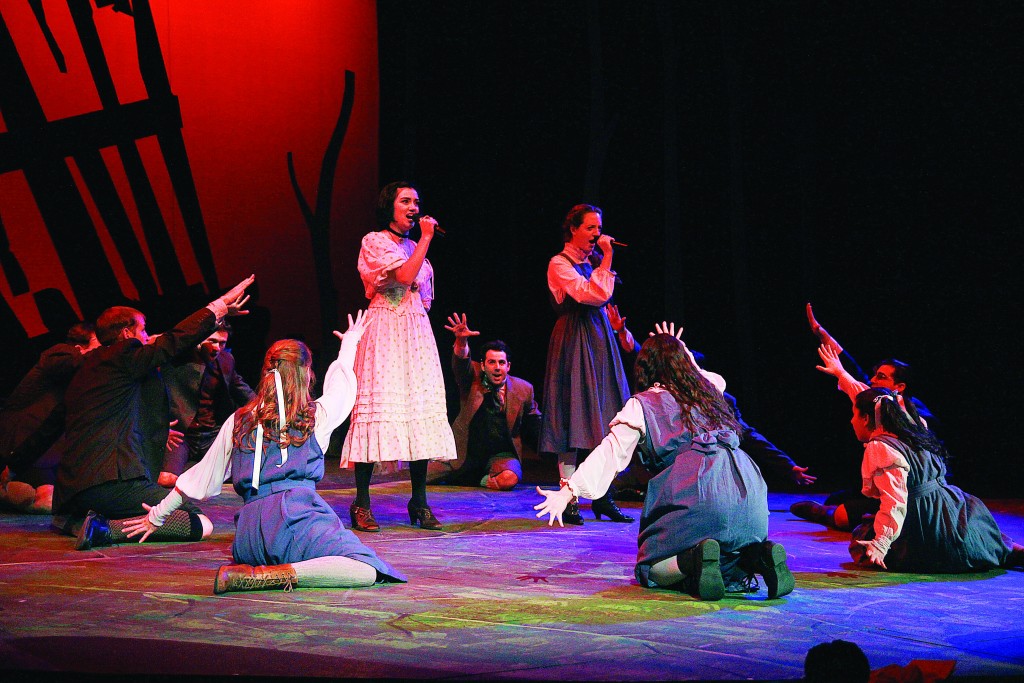
Though the winter weather is making its way through Binghamton, things are heating up inside the Watters Theater with Binghamton University’s second and final mainstage production of the fall semester, “Spring Awakening.”
The eight-time Tony Award-winning musical is based on Frank Wedekind’s play of the same name. When the play originally premiered in 19th century Germany, it was banned for its discussion of controversial topics. More than 100 years later, the play’s adaptation breaks just as many rules as the original. Both shows primarily follow the stories of Wendla and Melchior — children who grow up and fall in love within the confines of a rigid society — though it also discusses the lives of each of the children’s friends. In doing so, it illuminates the difficulties of growing up in a world where feelings and urges emerge, causing the characters to rebel against the adults in their lives.
The musical talks about controversial subjects like sexuality, domestic violence and teenage pregnancy, among others. Director Tommy Iafrate, an assistant professor in the theatre department, finds that the show does a good job at mirroring the difficulties of growing up.
“[I want people to] not to shy away from conversations that are hard,” Iafrate said. “That’s the tragic flaw that we see in all of the adults of the show — that we live in a society that shies away from controversial material, and this play says you can’t do that.”
It seems as though every minute of the musical exists as a highly personal moment, but in the way that Iafrate chose to stage it, the entire ensemble stands in the background of the set, watching and experiencing it for themselves.
“I think that the community of children in this world is very important,” Iafrate said. “So even though it often is not scripted for everyone to be there together, I feel that they are each other’s support system. They all learn and grow as one.”
Starting with the opening number, “Mama Who Bore Me,” Wendla admires her maturing body. Though she is the main subject of the scene, the other girls in the ensemble are present. Moments like these are recurring throughout the show — if the ensemble isn’t actively participating in the scene, they quietly observe.
The way that the cast drifts in and out of scenes is just one of lengths the creative team has gone to to create a surrealist landscape for the show. Innately, the show is already scripted to suspend reality every time a song starts — the moment that the music swells, the characters are transported into a kind of rock concert setting to accurately and loudly convey their emotions.
In that same vein, it seems as though every song and scene is an opportunity to create a dreamlike state. Some songs, like “Mama Who Bore Me,” or the sequence for the song “The Mirror-Blue Night,” are completely ethereal, with actors drifting in a carefully choreographed trance. In songs such as “The Bitch of Living” and “My Junk,” the children let their fantasies become out-of-control as they are played out onstage. Meanwhile, scenes that include the villainous schoolteachers are so exaggerated that they become akin to something out of the dark part of a fairytale.
In a musical about growing up, Thea, one of Wendla’s friends, asks one of the play’s biggest questions: “But how will we know what to do if our parents don’t tell us?” The show is an act of exploration, emphasizing the necessity of becoming different in order to become an adult. The audience is invited to reprimand the authoritative figures’ overbearing attitudes, and at points, in a trick of the light, the children literally stand in the shadows of their parents. However, watching the characters grow and break out of the rigid structure they exist within is one of the most compelling forces of the show.
Regardless of the mature topics, the musical is ultimately about children. From the opening number of the show to later scenes, such as the one where Wendla and Melchior are alone for the first time, the actors perfectly capture the sweetness in their characters’ innocence. Does this make them a little bit awkward from time to time? Yes — but that is vital to growing up.


